
Mass Effect 3
Written by: Rik
Date posted: August 11, 2021
- Genre: RPG
- Developed by: Bioware
- Published by: Electronic Arts
- Year released: 2012
- Our score: 9
Towards the final moments of Mass Effect 3, Commander Shepard checks in with one of his squad mates: a friend, colleague (and more, depending on your choices) since the first game. Shepard asks how she’s doing: she doesn’t turn to meet Shepard’s gaze, instead staring straight ahead, before responding, “This is it, isn’t it?”
It’s the kind of quote that you might expect to be deployed at some point in the final episode of a trilogy, and is indeed used to good effect in the pre-release trailers. But it’s not until that moment in the game itself that it takes on more significance: for all of the signs that you’re reaching the climax, and all of the Very Important chats that you may have had previously, it doesn’t quite all sink in until that moment.
There will be no more side-quests, no more scanning planets, no hanging around at the Citadel. When a trilogy has been talking about big finales, dangerous missions, and ‘the end’ ever since it started, you sort of stop taking it seriously. The actual end doesn’t quite seem real, until it’s virtually upon you.
The previous games, in true RPG fashion, mixed the need to deal with a big overarching threat with extended opportunities to explore, pursue seemingly trivial matters and generally prat around in a way that could sometimes make that threat seem rather distant. For all of Saren’s charismatic villainy throughout Mass Effect, he was never the real big bad, while the sequel took a big step sideways plot-wise, shifting plenty of elements (including some characters) out of the way to introduce new ones and send Shepard to the far reaches of the outer systems to battle a new enemy, of which the rest of the galaxy remained largely ignorant.
Here, though, the final battle that was always coming has finally arrived, and it undercuts everything that takes place in Mass Effect 3. For better or worse, this is a game about war, and this emphasis drives a noticeable switch in terms of tone and focus. Almost everything that you do now contributes something to the war effort, with completion of quests and missions adding points to an overall readiness score. And while conversations and personal stories are still given ample attention, they take place in the context of snatched moments between battles, with the sense of something much bigger going on in the background giving them additional urgency.
So: the Reapers are here, and the galaxy is not ready for them. Everyone should have listened to my peroxide man-Shep, of course, but though he starts the game back in Alliance ranks, he’s in some trouble with them for teaming up with human paramilitary group Cerberus in the last game (although if I had purchased and completed the relevant DLC pack for ME2, then his punishment would be for doing something much more specific). But, with long-time ally (now Admiral) Anderson vouching for him, just in time for the shit to hit the fan, it’s back to heroic galaxy-saving mode for Shep.
The bleak urgency of the opening walk and talks is a striking contrast to the detached sci-fi coolness of previous games; so much so, I figured that my imported Shep, who began the trilogy with a scar and bad teeth but seemed once again to have been improbably youth-ified between games, needed to be re-aged before proceeding. A quick trip to the appearance editor ensured that the stress of recent events was reflected in a Jude Law style receding hairline, and when combined with the sadly now-compulsory straight white teeth, it was pleasingly reminiscent of Gerard Butler struggling frantically to play a character much younger than he is. (Which is not something I necessarily knew I wanted, but, it turns out, I did).
My revised Shep seemed a better fit with the slightly more macho air to proceedings, with the same initial exchanges showing everyone dressed in rather tight-fitting fatigues, and introducing a new boulder-shaped squad-mate of alarmingly muscular proportions. Even switching Shep to a military uniform still kept things all a little too snug for my liking, with his distractingly bow-legged run throughout seemingly down to a combination of overdoing leg day in the gym and the Alliance-mandated slim-fit trousers.
With Shep (and the Normandy) back in Alliance colours, the way is paved for a reunification with former colleagues glimpsed only fleetingly during Mass Effect 2, and it quickly becomes obvious that some major players from the first game were temporarily moved out of the main story for the second chapter so they could return unscathed here. Conversely, given the number of possible squad mates, and the multiple possible outcomes regarding their fates, the potential complexities of unpicking all of that from an imported save means that many of the ME2 cast are largely reduced to extended cameos rather than playing a major part in events here. If Shepard’s switch to Cerberus seemed a little bit jarring in the first place, the move back to the Alliance seems a little less so, although fans of particular characters from the second game are likely to be disappointed even if they survived its events and make appearances here.
Despite the revised framing of the structure, it remains largely as before, with main missions supplemented by additional optional quests, only this time configured in terms of securing assets for the ongoing war. Even the planet scanning of the previous game has been reconsidered, with particular resources or artefacts that will be helpful in the war effort to be found dotted around the galaxy, although searching for them now comes with the added complication of the Reapers lurking in most systems. Alerted to your presence by repeated scanning, their addition provides an extra element of danger and risk, as well as prompting a mildly alarming race to exit the system before the Normandy succumbs.
It’s another revision of the dull planet-hopping of the first game and the relentless (but in my view fairly meditative) plundering of precious metals of the second, and I’m not sure it’s a particularly big improvement on either: systems now have to be left alone for a while once you’ve had a near miss with the Reapers, adding an extra level of annoyance to the busywork as you have to leave and come back later (after a ‘proper’ mission has been completed).
Under the circumstances, the specifics of what you’re meant to be looking for, and where to start, become more important, which is unfortunate, as the presentation of quest information is one of Mass Effect 3‘s major shortcomings. You can be given a planet or system name in the first instance, but no information on which cluster they’re in, or whether that cluster is even accessible at that point in the game (which, sometimes, it isn’t). This extends to the rest of the quest tracking, which to my mind worked perfectly well previously, but seems to have been inexplicably, and unsuccessfully, streamlined here. The journal no longer updates as you progress, and only shows you whether a quest is live or whether it’s been completed: never what to do next, which isn’t always clear.
On top of that, there’s a slightly bizarre new treatment of optional quests and conversations, which now take place outside of the traditional dialogue wheel system. Indeed, they seem to be based around Shepard simply overhearing a problem, then going off to fix it in secret without ever telling anyone, before showing up unannounced some hours later to tell a slightly surprised NPC that the great Commander Shepard has taken time out from saving the galaxy to look into and resolve the issue they were telling someone else about a few hours ago. I understand that at times the earlier games leaned a bit too far in the other direction perhaps and could rather drag things out, but this approach has the effect of making minor quests really feel minor.
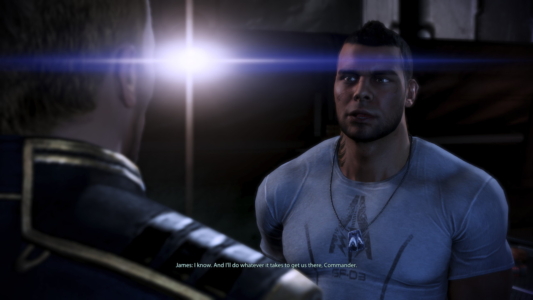
There are a few interesting voice-acting choices in supporting roles. James here is voiced by Freddie ‘Wing Commander’ Prinze, Jr.
These aren’t significant missteps, though, especially when set against the accomplishments of the main story, which has some heavy lifting to do in terms of tying up some fairly meaty loose ends from previous games. This is a task it achieves with aplomb, while drawing all of these stories into the wider context of the war with the Reapers. This means that the rumbling tensions dividing the Salarians and Krogan (and Turians), as well as those between the Quarians and Geth, all receive satisfying (and potentially heart-breaking) conclusions. In between, the forces of Cerberus are refusing to play nice and team up with the Alliance, instead showing up on a regular basis to disrupt Shepard’s efforts at every turn.
Usefully, although perhaps unrealistically, the game actually puts a number on just how ready you are, instead of making you work it out from how many side missions you’ve done and occasional bits of dialogue. In this 2012 incarnation, at least, a significant amount of emphasis was placed on the importance of also playing the multiplayer mode, to the extent that non-participation cuts your overall preparedness rating (Effective Military Strength) in half. And if you don’t have all the DLC, which you surely won’t, given how difficult and expensive it is to obtain outside of the new Legendary Edition, then that further affects your chances, and you’ll have to make sure you pretty much do literally everything else before committing to the final battle. As with the last Mass Effect 2 mission, it’s not necessarily the case that your overall chances of success are impacted if you don’t, more that the fates of your squad, and potential number of choices at the very end, will be instead.
The combat itself seems to have continued on its path from slightly shonky RPG to manly military action-fest, with the war motif demanding the inclusion of shaky-cam dropship cut-scenes plonking you straight into the action. Things have evolved further in terms of the combat dynamics, and not only will you now be flanked by squads of enemies, as in ME2, but those from Cerberus now deploy smoke bombs, which mess with your targeting and prevent you from simply hiding behind a crate until someone pops their head up and lets you shoot them.
The Reapers, meanwhile, supplement their hordes of fairly drone-like baddies with semi-boss style characters like the nightmarish Banshees, whose biotic abilities and general resistance to ammo make them tough to avoid and then defeat, or the massive Brutes, who get up close and smash you with melee attacks, from which you occasionally have to hammer a button to effect an escape. Particularly in the case of the latter, it all gets a little bit ‘macho modern console shooter’ to my taste at times, but it’s possible that I’m just being a bit of an old fuddy-duddy.
Shep went from being a complete dope without adequate investment of skill points to an all-talented deployer of weapons between the first two games, and here the balance has swung back slightly towards the former’s RPG leanings. There’s more consideration given to selection of weaponry and loadouts, and in particular, the weight of each weapon, with the overall weight linked to power cooldown times. You can definitely see the intention to bring back some of the weapon tinkering from the first games, without it ever really seeming like it matters all that much.
Even as a soldier character, I didn’t feel the need to take everything into battle, and ended up eschewing the sniper rifle and shotgun, in favour of a weight advantage and quicker regeneration of powers. Although it must be said that, in some of the more fraught battles here, the need to vary weapons, as well as make timely and effective use of your squad’s powers, is more important than ever. By extension, so is squad selection itself, although sometimes you’re torn between the ally whose skills you need vs the ones whose company you enjoy and want to see more of during the key moments. There’s also quite a good gimmick which sees you having to choose a member of the team to do a task, like hack into a computer, which puts them out of action while you and the other one have to fend off enemies for a short period.
While all the action has been refined, the sense of exploration has been diminished: looting bases for cash and equipment is still part of the game, but occasionally gets lost in the relentlessness of the action, while hacking mini-games have now gone altogether. I understand that some people really hate the latter as a general principle, but I rather missed them, and it’s another respect in which the game feels more like it’s more purely focused on combat. There are also times when it’s hard to see exactly where you need to go next, and with the maps of the first Mass Effect a distant memory, now limited only to non-combat areas like the Citadel, any manual exploration of levels in search of the way forward reveal them to be altogether smaller and narrower than you might expect.
In some respects, ME3 is a case of one step forward and one step back from previous games. The Citadel, for example, may now be bigger and fuller than ever before, but it somehow doesn’t have the magic of your initial trips to it in the first outing. It’s good, too, that characters on the Normandy now move around between missions, giving the impression of a living ship with crew that work together rather than just staying in their room waiting for Shepard to visit them, but on the other hand, interactions are sometimes handled in the same way as minor quests, without a switch to the dialogue wheel, making them feel a less integral part of the game. It’s better than starting a conversation when there’s nothing new to say, but when you see Shepard’s bored/stretching animation play as a crewmember says something sad, you wonder how much has really been gained.
But, ultimately, Mass Effect 3 can’t help but provide a satisfying resolution to the series. It knows that players of the trilogy want payback for the time invested, and decisions made, in previous games, and is committed to delivering. It does feels at this stage as if the Shep of ME3 has fewer opportunities to make massively different Paragon or Renegade choices than before, as if the events of the game carry you along a particular path to a certain extent. But I also saw a new side to my Paragon Shep: while previously, there was a slightly naïve-sounding Commander who spoke about understanding how tough the war is and how everyone might not make it but without ever seeming to believe it, we now have a Shep who doesn’t have things all his own way, who seems tired and frustrated at times, as well as slightly haunted by the events of the trilogy as a whole, however much he might have done the ‘right’ thing. It’s another way in which the game makes you believe in the war, the high stakes, and the potential for loss.
And so, sundry other minor gripes elsewhere can also be overlooked: the stupid new bad guy assassin; the slightly forgettable new additions to your crew; or the bits where you unexpectedly become the arbiter of the ethics of human/AI romantic relationships, and feel silly about it, whatever decision you make. As for the controversial ending, it’s hard to comment too much without spoiling anything, except to say (unsurprisingly) I think that the big fuss about it seems, from this distance, to have been a massive overreaction.
If I understand correctly, the main bone of contention was the brevity and simplicity of the finale, with fans expecting more of a say in the outcome of the galaxy. With regard to the former point, I later found out that I had the version of the game with the Extended Edition DLC installed, so perhaps that addressed some of those issues. In terms of the latter, I was actually surprised to be presented with any element of choice, Deus Ex style, in terms of the final resolution.
To be frank, I never really expected that to be part of the deal: my understanding of the choices in the series was always about the comparatively smaller things: the relationships, the characters, and the impact of your decisions with regard to them spanning across the trilogy. Just as in Mass Effect, the end involves defeating Saren, and in the sequel, the Collectors, in the third, I thought it would be a matter of overcoming the Reapers, which (if it’s not a spoiler to say so) it is.
The resolutions I wanted, I got. As mentioned already, most of the main missions involve resolving big conflicts between races, and potentially losing valued friends and colleagues along the way, as well as keeping up with those who survived and shared previous adventures. Even without most of the DLC in place (including the final piece of fan service, Citadel), there was still an opportunity for extended conversations with all surviving characters prior to the final battle.
Indeed, by the end, I was not only satisfied, but also somewhat overwhelmed by the strength of feeling I experienced. It really felt like I’d been on a journey with peroxide man-Shep, his squad mates and companions, and I found it hard to accept that it was all over. And inexplicably, despite an unusual and possibly unrepeatable set of personal circumstances allowing me to get through the entire trilogy within the last six months, I also imagined myself doing it all again someday.
I understand, and possibly agree with, those who like the second game the most, and there’s no doubt there are a few changes that are a bit iffy here, but there’s also a satisfying conclusion too, one that skilfully brings a lot of disparate elements and variables together, and certainly a more than adequate payoff for most of what you’ve been working towards. Yes, Liara, this is the end, and I can’t quite believe it either. Whatever the strengths and weaknesses of individual elements, as a trilogy, Mass Effect is certainly a unique experience, and therefore comes with a very high recommendation.

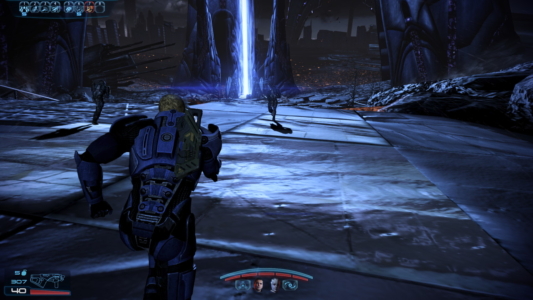
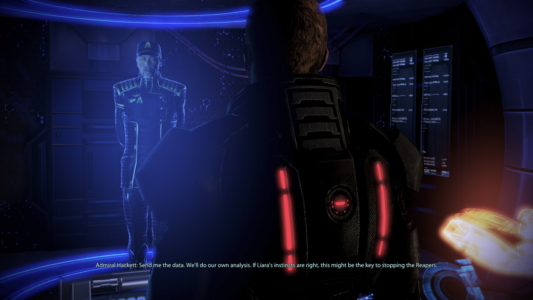
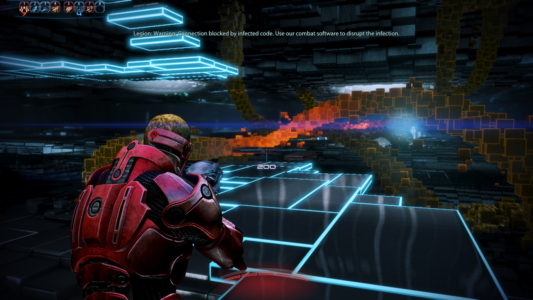
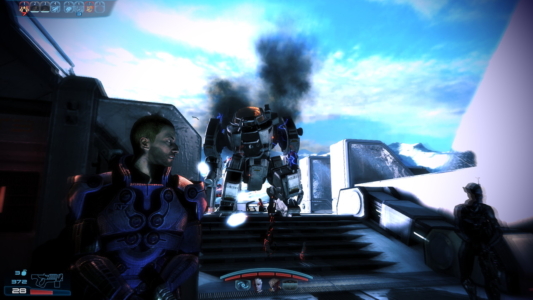
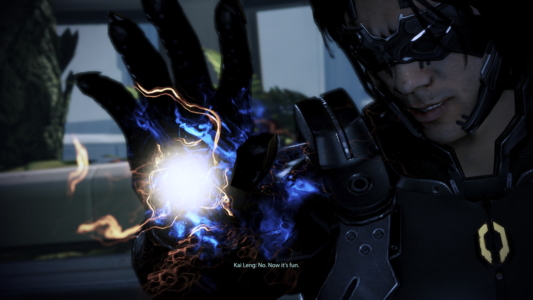
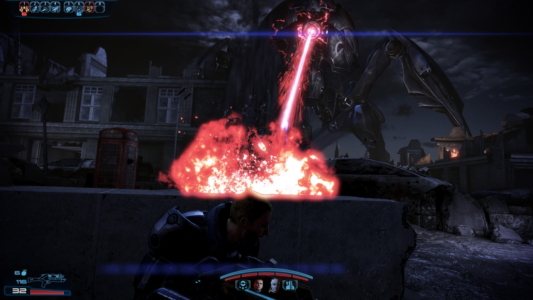

 Posts
Posts
I have tried to avoid reading spoilers about this series thinking that I’d play it some day but reading this made me realize that it’s never going to happen. I got as far as installing the first game and sitting through the opening cut scene, and this was well over a decade ago. Hard to believe that it has been that long.
I remember the first game being a huge deal with it came out and people also making a big stink about the conclusion to the series. Judging by your review, it sounds like the story was at least tied up. In retrospect, this series seems like it played a major role in paving the way for games that focus more on story at the cost of other elements, as well as shoehorning in unnecessary social and political commentary. Maybe it’s good that I never got invested in it.
August 11, 2021 @ 11:32 pm
“As for the controversial ending, […] I think that the big fuss about it seems, from this distance, to have been a massive overreaction.” : exactly the same weird phenomenon as Game of Thrones’ ending. Considering a satisfying end is almost always the most difficult part of any novel or scenario, I think Mass Effect’s script writers did a decent job for the end (not outstanding but decent). Worth replaying (even though I don’t have any DLC nor consider getting any of them).
Thanks for Yet Another Nice Review. It was worth the wait.
August 12, 2021 @ 6:03 am